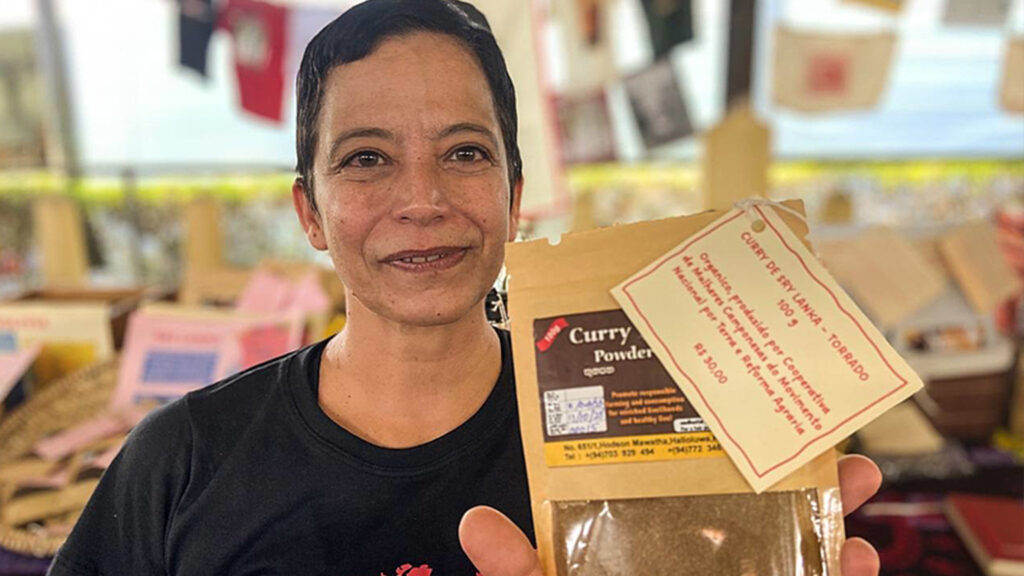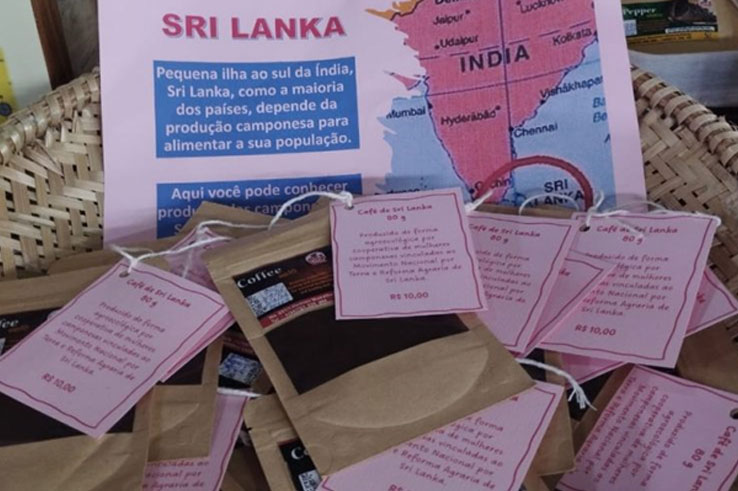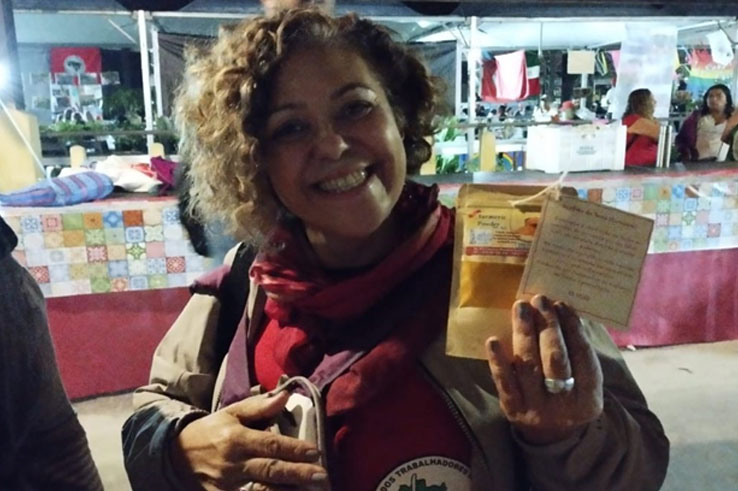ECO APE COOP’s Journey to Latin America
ECO APE COOP’s Journey to Latin America !
Our smallholder farmers products were sent to International Agrarian Reform Fair organized by Brazil’s Landless Rural Workers Movement (MST). Value added products were met with roaring compliments by the both local and International customers at the Fair which was held between 11th of May to 14th of May 2023 in São Paulo, Brazil.
For the first time in its history, the event received international delegations from Asia, Europe and Latin America who brought with them products developed from agroecological growing processes.
According to Cássia Bechara, a national leader with the Landless Rural Workers’ Movement (MST) and an organizer of the internationalist stall that brought together agroecological products alongside posters calling for the release of Australian whistleblower Julian Assange and Palestinian liberation, the items displayed have deeper meaning than the fact that they come from peasants.

They carry, in her words, “common elements” such as the “construction of agroecology, food sovereignty, and commercialization” to foster what she defined as a “peasant economy,” an alternative to the dominant model of monoculture production.
The fair received delegations and products from Mexico, Colombia, Argentina, Venezuela, Bolivia, Sri Lanka, Nepal, Indonesia, Palestine, Congo-Brazzaville, and Norway. The International Peoples’ Assembly (IPA) joined hands with the MST’s International Collective to organize the stall. During the four days, members of the foreign delegations sold their products and participated in panel discussions.
Among them were themes ranging from campaigns against economic blockades—such as those currently experienced by Cuba and Venezuela—and solidarity with countries fighting for their territorial, cultural and political sovereignty.
In this way, Cássia explained that it was possible to “bring a bit of the struggle of peasants from all over the world from their production.” She added that “this is the first time that the Unión Comunera [of Venezuela] is going to have an experience of commercialization.”
At the fair, one could find olive oil from Mendoza, a region famous for wine production in Argentina, Colombian coffee, Bolivian quinoa, and Sri Lankan curry. The Mexican mole—a mixture of spices—was available at cost price for only R 15 or USD 3.
By heaven or by earth: the paths that lead to the MST Fair
Transporting the agro-ecological produce from so many places in the world required effort and even a little bit of improvisation. A good part of the volumes sold were brought in suitcases by Cássia after a meeting in Colombia with leaders of peasant organizations. But there were also those who preferred to travel thousands of kilometers by land.
This is the case of Juan Martin, who shared the wheel of a pickup truck with a travel and movement partner. Juan is a member of the Rural Federation of Argentina and lives in the Buenos Aires province. By car, he transported honey, olive oil, olives and pamphlets to the Água Branca Park, the site hosting the Agrarian Reform Fair.
He said that he was excited to “share the internationalist stall with the MST” and that in his country he participates in the “struggle for access to land, for the agrarian reform law and to fight inflation.”

Argentina suffers from a serious inflationary problem, which has driven part of its population into poverty. Martin said that inequality had not been exclusive to his country and that it was a “problem all over the world, because there is a lot of production [of food] and hunger at the same time. That is why food has a central role in the economy.”
According to Martin, the federation he is a part of is present in 20 of Argentina’s 23 provinces and brings together more than 30,000 families at the national level who sell their produce through the “People to People” platform.
The experience of producing food from the social movement also served as an inspiration for the Venezuelan communes, grassroots organizations created during the government of late former president Hugo Chávez. Today, the Latin American country has 3,940 communes, which are dedicated, among other activities, to the production of agroecological food.
For Carmen Reyes, director of Social Movements at the Ministry for Communes of Venezuela, the commercialization of Venezuelan products at the MST Fair “opens many possibilities. It is an opportunity that was made possible due to President Luiz Inácio Lula da Silva’s new government, now conditions for exchange can be generated and Venezuela can become an economic partner again.”
Reyes explained that “by 2025, it is expected that 100% of the Venezuelan population will be urban.” With that, food products would have to come from abroad, further increasing the country’s dependence on imports. However, the communes have, in her words, “reversed that trend.”
Feeding the world
Data reveals, year after year, that hunger and poor nutrition do not respect borders and can be experienced intensely even in countries that lead in food production, such as Brazil.
A total of 828 million people are in this situation worldwide, according to the United Nations (UN). More than half of the Brazilian population—125 million people —live in a situation of food insecurity, that is, without full access to food.
Despite this, the Brazilian experience can be a guide on how to overcome this problem. This is what Rafael Arantes, a researcher in Public Health Nutrition at the University of São Paulo (USP), said.
According to him, despite the latest setbacks in important indicators, “Brazil has not ceased to be a reference for the world with regard to public policies. We have already taught how to deal in a significant and forceful way with the fight against hunger.”
According to Martin, the federation he is a part of is present in 20 of Argentina’s 23 provinces and brings together more than 30,000 families at the national level who sell their produce through the “People to People” platform.
The experience of producing food from the social movement also served as an inspiration for the Venezuelan communes, grassroots organizations created during the government of late former president Hugo Chávez. Today, the Latin American country has 3,940 communes, which are dedicated, among other activities, to the production of agroecological food.
For Carmen Reyes, director of Social Movements at the Ministry for Communes of Venezuela, the commercialization of Venezuelan products at the MST Fair “opens many possibilities. It is an opportunity that was made possible due to President Luiz Inácio Lula da Silva’s new government, now conditions for exchange can be generated and Venezuela can become an economic partner again.”
Reyes explained that “by 2025, it is expected that 100% of the Venezuelan population will be urban.” With that, food products would have to come from abroad, further increasing the country’s dependence on imports. However, the communes have, in her words, “reversed that trend.”
Feeding the world
Data reveals, year after year, that hunger and poor nutrition do not respect borders and can be experienced intensely even in countries that lead in food production, such as Brazil.
A total of 828 million people are in this situation worldwide, according to the United Nations (UN). More than half of the Brazilian population—125 million people —live in a situation of food insecurity, that is, without full access to food.
Despite this, the Brazilian experience can be a guide on how to overcome this problem. This is what Rafael Arantes, a researcher in Public Health Nutrition at the University of São Paulo (USP), said.
According to him, despite the latest setbacks in important indicators, “Brazil has not ceased to be a reference for the world with regard to public policies. We have already taught how to deal in a significant and forceful way with the fight against hunger.”

In 2014, Brazil left the Hunger Map of the Food and Agriculture Organization of the United Nations (FAO). In 2018, the country returned to the ranking.
Arantes explained that Brazil improved its rates in the first two decades of this century because of the combination of comprehensive public policies and the advance in the understanding that access to food is also a human right.
Regarding the latest setbacks, he argued that “they [these policies] had been disrupted in recent years. All this was aggravated by the pandemic and the austerity policies, which had a direct impact on people’s lives.”
Rafael Arantes further stated that food production by the MST is something relevant, not only for the production of agroecological rice, because it shows the “potential of movements in general.”
He maintained that the “movements have always been organizing and producing, independent of governments,” but now “Brazil can place itself in a more robust way in the world in relation to food production without the use of pesticides. We need to reverse the logic of the incentives, we need to favor the farmers who are in this [type of] food production and also motivate others to make the transition to this model.”
“The expectation is that with the return of Brazil’s investment in public policies for food, the country will once again lead this agenda, in the coming years, in the world,” he concluded.
Arantes explained that Brazil improved its rates in the first two decades of this century because of the combination of comprehensive public policies and the advance in the understanding that access to food is also a human right.
Regarding the latest setbacks, he argued that “they [these policies] had been disrupted in recent years. All this was aggravated by the pandemic and the austerity policies, which had a direct impact on people’s lives.”
Rafael Arantes further stated that food production by the MST is something relevant, not only for the production of agroecological rice, because it shows the “potential of movements in general.”
He maintained that the “movements have always been organizing and producing, independent of governments,” but now “Brazil can place itself in a more robust way in the world in relation to food production without the use of pesticides. We need to reverse the logic of the incentives, we need to favor the farmers who are in this [type of] food production and also motivate others to make the transition to this model.”
“The expectation is that with the return of Brazil’s investment in public policies for food, the country will once again lead this agenda, in the coming years, in the world,” he concluded.
| M | T | W | T | F | S | S |
|---|---|---|---|---|---|---|
| 1 | ||||||
| 2 | 3 | 4 | 5 | 6 | 7 | 8 |
| 9 | 10 | 11 | 12 | 13 | 14 | 15 |
| 16 | 17 | 18 | 19 | 20 | 21 | 22 |
| 23 | 24 | 25 | 26 | 27 | 28 | 29 |
| 30 | ||||||
Search
Causes

ALL CONTACTS
- No. 57, 1st Lane, Meda Welikada Road, Rajagiriya, Sri Lanka.
- +94 112 870 369
- monlar@sltnet.lk
- www.monlar.lk
SUBSCRIBE
Subscribe us to get latest updates of Sri Lankan Peasant movement
Error: Contact form not found.
- Monlar - Copyright 2024
- donations@ong.com
- volunteers@ong.com
- contact@ong.com












Leave a Reply